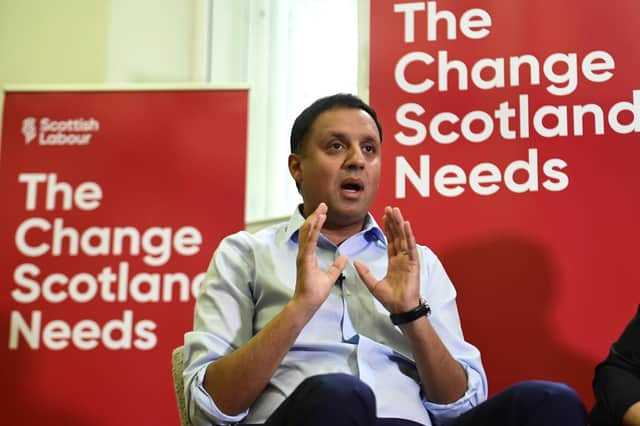Why Anas Sarwar is right to reach out to pro-independence voters - Brian Wilson


In response, the normally reasonable chairman of the Scottish Tories, Craig Hoy, denounced “reaching out to pro-independence supporters” as an indication that “Anas Sarwar feels there is common ground between his party and the Nationalists."
The logic of Mr Hoy’s response would be to entrench Scotland, deeper and more uselessly, in an assumption that the constitution is the immutable dividing line of Scottish politics. I doubt if that makes much sense even from a Tory perspective beyond the shortest of terms.
Advertisement
Hide AdAdvertisement
Hide AdWhat Mr Sarwar offered is more fundamental than just looking for votes. It should be the start of a re-definition process in which the dynamic of competing ideas in Scotland is again built round issues which directly affect people’s lives and by which political values and parties should be judged.
The inference that as part of this transition, pro-independence voters must first sign a disavowal of that objective is absurd. The only way their views on that subject might evolve is through demonstrable evidence of alternatives which make better sense.
Disillusionment with the SNP has opened the door to that process. However, the difference between voting intentions and continuing support for independence is significant. For many Scots, movement on the former does not mean abandonment of the latter. That should be respected rather than spurned.
When the SNP gained power by a whisker in 2007, it opened the door not just to a change in government but to a deep realignment of these dividing lines. For those who found themselves in opposition, I think the significance of that change took too long to sink in and therefore to resist effectively.
From that point onwards, every action of the Scottish Government and every pound spent, had a secondary – or perhaps primary – motive. It was not to achieve optimum outcomes for Scotland but to emphasise difference from the rest of the UK, to foster grievance and hence build the case for independence.
Complaining about that is pointless because that is what Nationalism is about – instilling the doctrine that independence is the elixir and everything else is a means to that end. Over these 16 years, vast amounts of public money, immeasurable hours of political strategising and meticulous attention to political symbolism have gone into re-defining the terms of Scottish politics.
And of course, it has been pretty effective. It made the SNP the dominant political force in Scotland. It secured a referendum on independence with a substantial minority in favour. But most crucially it transformed the parameters of political debate to which a generation became conditioned.
Nobody in their late 20s has known anything else while you need to be a good bit older to remember a time in Scotland when elections were fought primarily on social and economic issues without the over-riding question of whether outcomes on these matters were inextricably linked to the constitutional settlement.
Advertisement
Hide AdAdvertisement
Hide AdInevitably, therefore, attitudes hardened around that question. There is a substantial core of pro-independence voters who are not going to be shifted from expressing that allegiance at the ballot box. But there is at least an equal number who are prepared to prioritise the need for change on so many other fronts, at least temporarily.
That is the significant proportion of Scottish society that Anas Sarwar wants to persuade – and he is not going to achieve it by telling folk they are hopelessly wrong about the constitution, so they had better forget all that stuff before even thinking of voting Labour. That would be the politics of gross stupidity.
If pro-independence voters are going to be moved away from that position, it will not be by telling them they are misguided and deluded but by demonstrating the potential of alternatives, from which they have been denied awareness for the past 16 years.
I’m not sure why Mr Hoy should think that a bad idea either. Much of the Tory base in Scotland was lost to the Nationalists, rather than to Labour. There is no shortage of natural Tories in the SNP, a third of whose voters backed Brexit. I would have thought a bit of “reaching out” would do them no harm either, rather than simply digging deeper into the Union trench.
I was at a public meeting this week addressed by Ian Murray, the Shadow Secretary of State for Scotland. The questions were serious and urgent but a notable point was that neither the constitution nor the SNP was mentioned by anyone who asked them.
They were about the importance of Labour recognising the crisis in mental health among young men and the need for a strong policy commitment; about the “decimation” of Further Education at a time when we need skills; about the cruel treatment of local government funding… all the meat and drink of real politics. A straw in the wind, if you like, but maybe indicative of a wider shift.
Sixteen years ago, the SNP seemed to many a vibrant alternative worth taking a chance on. They seized that opportunity to re-shape Scottish politics, using every lever at their disposal. A generation of voters has known nothing else.
Now there are quite different perceptions. The SNP/Green Government looks like a jaded, incompetent, tarnished Establishment which failed to deliver the progressive change it promised. That opens the door to persuasion which will not be achieved by shouting: “You were wrong”.
As Ian Murray put it: “Give us the opportunity to prove to the public that politics can be a force for good”. In Scotland and throughout the UK, that is a plea which has resonance and urgency.
Comments
Want to join the conversation? Please or to comment on this article.